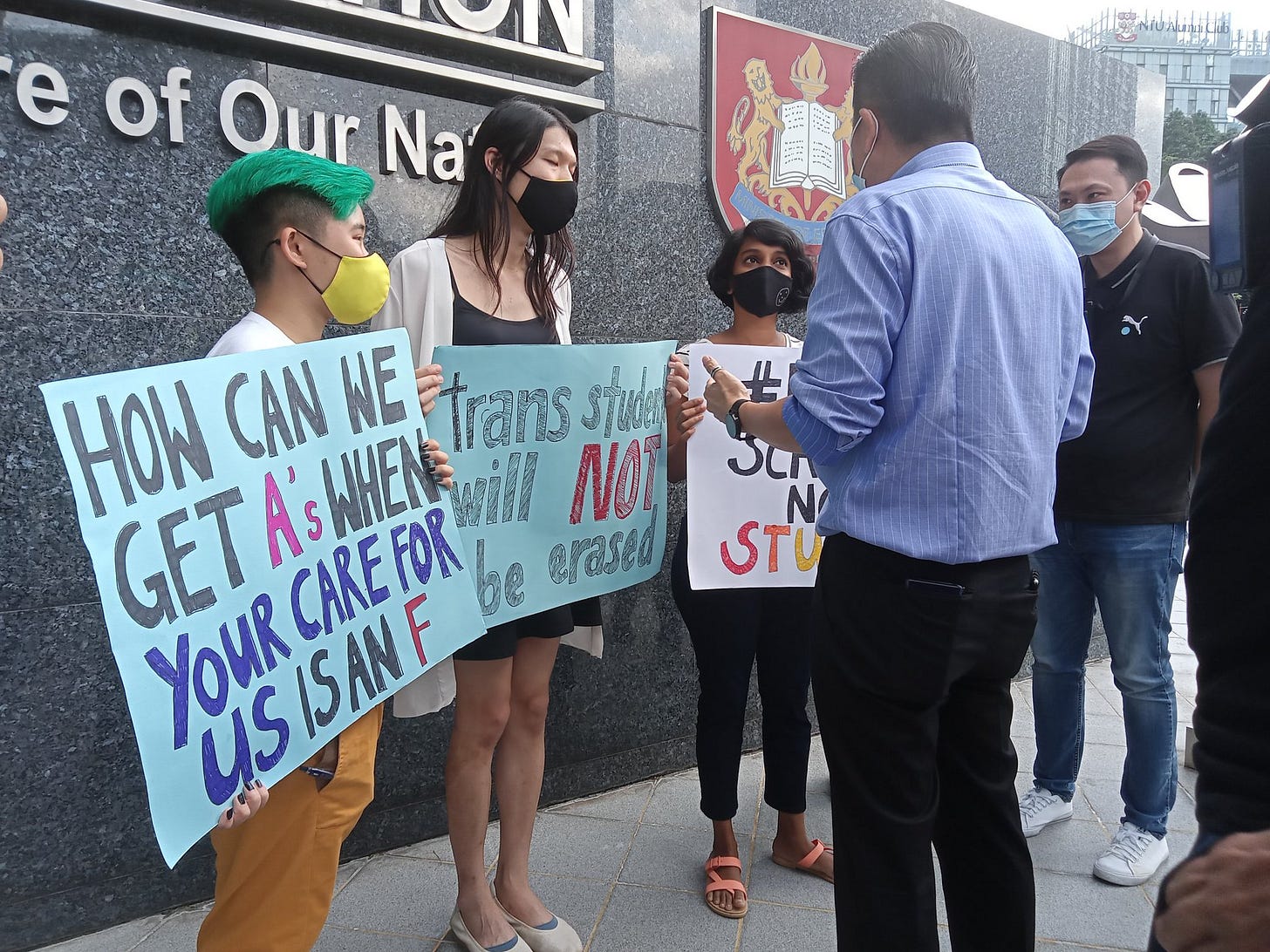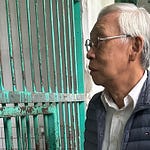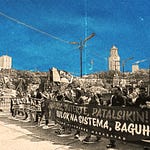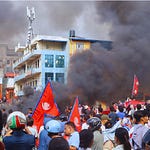From military bans and bathroom bills to debates on who can compete in which sports — despite making up only a tiny fraction of the population, trans people have become the go-to scapegoats in (often bad faith) political and cultural debates.
Many cisgender politicians, celebrities and other public figures (particularly in the US and UK) have jumped on the bandwagon, leveraging the trans rights debate for clout — often at the expense of the rights, safety and dignity of actual trans people.
In the Indo-Pacific region, the situation remains complex. For instance, while trans people have more visibility and experience less prejudice in Thailand, the issue of trans rights in Indonesia and Malaysia is much more contentious.
To its credit, Singapore has so far avoided going down any populist rabbit holes when it comes to the rights of trans people. But whether this will remain the case is uncertain, with global trends targeting trans people feeling like a ‘sword of Damocles’ hanging over the heads of many in Singapore’s community.
“I’d be lying if I said I wasn’t worried,” says Ellis Ng, a journalist and social media and editorial lead for rights group, TransgenderSG. “I’m extremely worried.”
Gender & sex in the city-state
Considering the sanitised, heteronormative sheen of modern-day Singapore, it might come as a surprise to learn that the country once had a vibrant and visible trans community. This was particularly true on Bugis Street (barely a couple of miles from central Singapore), known around the region as one of the hangout spots for members of the trans community from the 1950s until the area underwent significant gentrification in the 1980s.
Singapore was also a pioneer in trans healthcare. Gender-affirming treatment for the trans community was legalised in the 1970s, and the first gender reassignment surgery in Asia was performed at Kandang Kerbau Hospital in 1971.
This isn’t to say that everything has been a bed of roses for the LGBTQ+ community in the socially conservative nation. Far from it.
Prudish legacies of British colonialism still hover in the cultural ether in Singapore, most famously Section 377A, a colonial-era law which prohibited sex between men; although it had not been enforced for years, Singapore’s government continued to keep statute on the books until 2023, largely due to pressure from influential conservative religious groups. Same-sex marriage is still illegal, same-sex couples face multiple difficulties when it comes to adoption, and LGBTQ+ representation in the media is heavily policed or restricted.
The country’s trans community has, for now, not experienced the same levels of prejudice and discrimination seen in other parts of the world. Politicians in Singapore have not pounced on the mere existence of trans youths as a reason to restrict sports participation in schools, and supposed feminists do not regularly harangue trans people as a ‘threat to womanhood’.
Instead, Singapore’s trans community faces discrimination at a far more bureaucratic level, often grappling with numerous institutional barriers that prevent them from living as their fullest selves.
Financial issues are often at the forefront. As Ellis notes: “The path to being ourselves is expensive.”
Unemployment remains disproportionately high for Singapore’s trans community — something particularly harmful in one of the most expensive countries in the world. Trans people under the age of 21 often struggle to properly access gender affirming care, which means that people are often forced to transition later in life.
Singapore’s infamous technocracy has also presented barriers for trans people, notably in public housing, a sector rooted in government efforts to promote traditional ‘nuclear family’ models.
In 2017, the Housing Development Board refused to hand over the keys to a flat to a young couple because one partner had officially transitioned, turning their state-approved, ‘heterosexual’ marriage into a same-sex union. A typically efficient system ground to a halt as bureaucrats — unwilling to stray from the official prioritisation of straight couples — figured out what to do.
Ultimately, the Registry of Marriages unilaterally voided their marriage, and the couple were only allowed to purchase a flat half the size of the one they’d initially signed up for — and with less government subsidy than they would have enjoyed as a straight couple.
#FixSchoolsNotStudents
Many of the issues facing Singapore’s tiny trans community often go under the radar, which made the events of January 2021 even more exceptional.
In early 2021, Ashlee, a trans student at a junior college, publicly shared her struggles with her school and the education ministry in a Reddit post. The issues she raised resonated with many young LGBTQ+ Singaporeans, many recognising the systemic restrictions, boundaries and limitations queer youth have had to navigate in a conservative system. The post went viral and prompted #FixSchoolsNotStudents, a rare protest outside the Ministry of Education’s headquarters.
The demonstration didn’t last long. The protestors were barely able to assemble and hold up their placards before plainclothes police officers appeared. Uniformed police were on the scene soon after, demanding the remaining three protesters (the other two had left right after posing for some photos) disperse; when they refused, their signs were confiscated while they were arrested and ushered into police vans.

In most other countries, five people standing peacefully with a few signs in front of a government building for about 20 minutes would barely attract any notice, let alone trigger such swift police action. But Singapore is not like other countries, and with laws restricting or banning most public assemblies, even such a tiny protest made a statement that got people talking, especially on social media.
A few days later, then-Education Minister (now Prime Minister) Lawrence Wong addressed the issue in parliament. He affirmed the government’s commitment to all students, including trans students. But he also issued a warning: “We should not import these ‘culture wars’ into Singapore.”
For trans rights supporters, that remark rang hollow — or even revisionist. “I wouldn’t call him ignorant of history,” says Ellis. “But when you say we’re a ‘Western’ thing, then it really does ignore the history trans people have had here.
“We’ve been here. We’ve always been here. And you can’t really ignore that.”
Transgender Stories
For this episode of Currents, I spoke to Ellis about the history of the trans community in Singapore, the current state of trans rights, and what her main concerns for the future are.
On August 16th, TransgenderSG are hosting Transgender Stories, an event where four trans Singaporeans talk about issues like coming out, their time at school, and the realities of their work and daily lives. TransgenderSG’s site also offers a wealth of resources for people in Singapore who want to know more about the realities of transitioning, from statistics to where to look for support for surgeries and social transitioning.
For more organisations offering support for those currently or thinking about transitioning, Transbefrienders offers peer support services for transgender youth in Singapore, and The T Project is “Singapore’s first and only social service for the transgender community”.














